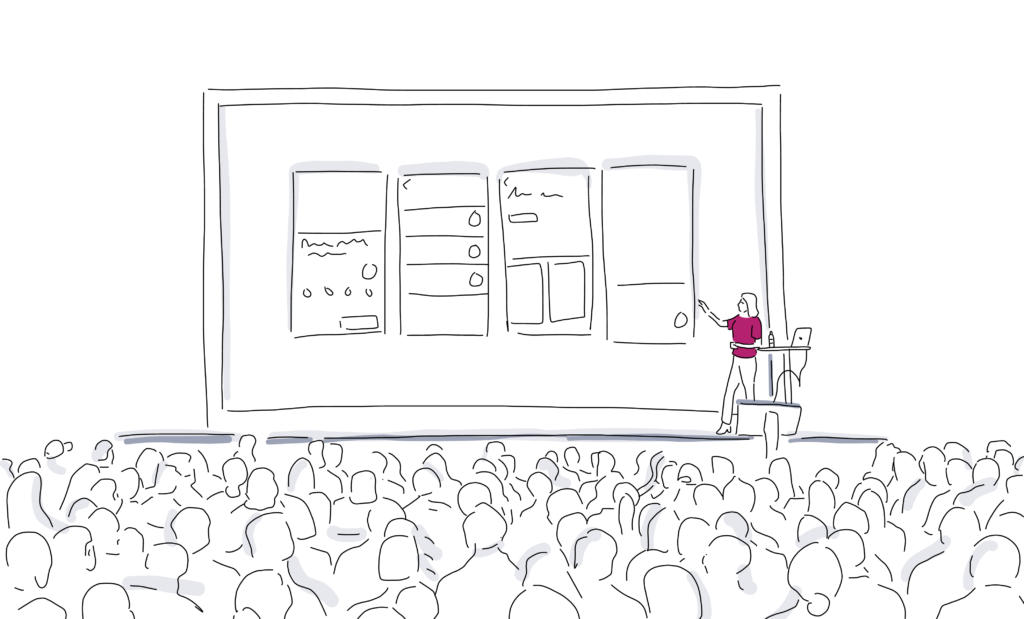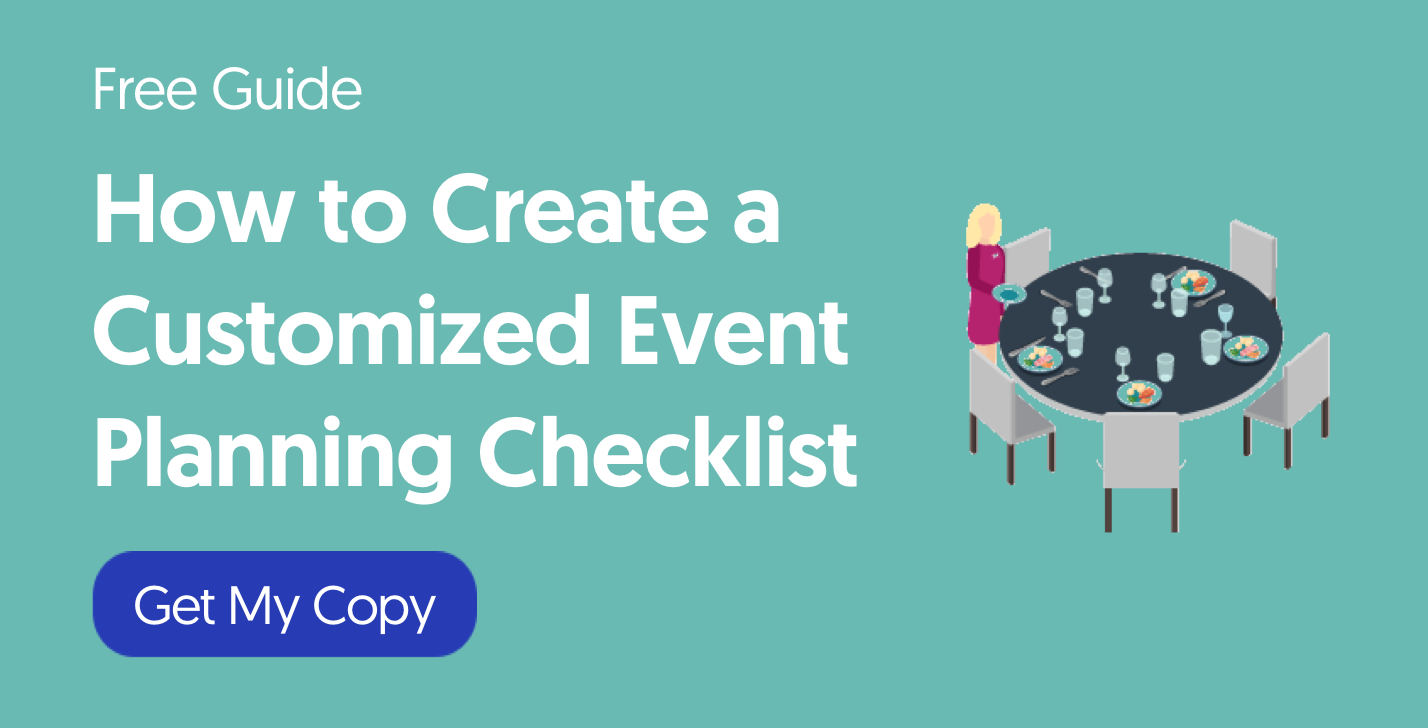
7 Must-Know Marketing Secrets for Successful Events
You already wear many hats as an event planner: You’re a creative, a project manager, and a budget specialist. If you plan large-scale events, you need to add another skill to your toolbelt: event marketing professional.
Marketing is how you spread the word about your event. Successful promotion targets the perfect audience, builds your attendee list, and creates a marketing ripple effect that increases your reach. Incorporate any of the tactics to make the most of the time, creativity, and money you spend on event marketing:
1. Establish your event marketing goal and the most critical metric for your event
More than performance: Your marketing efforts should work toward a well-defined goal. While goals and metrics may look similar, the specifics will vary from event to event”within your organization and across the events industry. Strategic planning can help you reach your event goals and objectives. Define a specific, measurable performance goal and target your marketing efforts with that top of mind. Some common goals”and strategies for success”include:
Event goal: Sell 30 percent more advance tickets
Increasing ticket sales means attracting a new audience. Branch out while still targeting relevant audiences to hook new attendees and boost advance ticket sales. Track monthly registrations and watch for trends to see what’s working”and where you need to improve.
Strategies:
- Advertise to similar (but untapped) audiences on social media. Consider an outdoor sports supplier conference that draws athletic supply companies but wants to reach general retailers that also sell sports gear. Target those small retailers with relevant hashtags and mini-campaigns in small business publications.
- Provide discounts or incentives for first-time attendees.
- Count on your returning audience for recruitment: Personal referrals are considered more trustworthy by consumers, and are therefore more likely to convert than traditional advertising campaigns. Spark referrals with these strategies:
- Offer a room or ticket upgrade after three referrals.
- Announce a prize for the attendee with the most referrals.
- Host a giveaway for tickets, swag, or upgrades”early registration earns an entry.
- Promote a discounted ticket package to encourage guests to bring a colleague or friend.
- Have ticket sales up and running when you announce your event so people can buy right away.
- Start strong with a limited-time discount on advance ticket sales.
- Let people know when tickets are selling well or if there’s a limited number of seats”scarcity can boost demand.
Event goal: Build an audience of 50-percent repeat attendees
Hooking repeat attendees is less expensive”and easier”than earning sales from new attendees. Keep tabs on your existing audience and stay in touch year-round to earn loyal repeat visitors. Attendee surveys can reveal the length of your relationship, as well as the reasons they keep coming back.
Strategies:
- Offer pre-ticket launch early bird pricing for past attendees.
- Provide special incentives for returning attendees.
- Keep the schedule fresh and interesting so there’s something to gain by returning
- Foster previous attendee engagement by asking opinions, communicating, and acting upon their requests.
- Seek out and build relationships with repeat attendees who have an influential social media presence to create brand ambassadors.
- If possible, announce the date of your next event before your attendees leave the prior year’s event.
- Allow guests to lock-in a price for the next year, at a discount.
Event goal: Increase pre-event revenue by 20 percent
Boost earnings in the months leading up to your event with add-ons, group pricing, discounts, and perks.
Strategies:
- Offer add-on packages (big or small) during ticket purchase. Some possibilities:
- VIP upgrades for tickets or rooms
- Tickets for an exclusive dinner with event speakers and special guests
- Add-on +1 tickets at a discounted rate available only at check-out
- Parking passes for the most convenient spaces
- Limited edition event T-shirts, buttons, or totes
- Capture group sales with tiered ticketing options that include valuable benefits, such as:
- Reserved seating
- Group transportation from the hotel to the venue
- A pre-event networking hour for group registrations
- Offer opportunities to upgrade after ticket purchase. Capture upgrade interest with these strategies:
- Remind guests to lock in special pricing for additional tickets in the registration confirmation.
- Include the option to purchase a discounted parking pass or metro card in informational emails.
- Invite guests to add extra sessions within emails detailing the event schedule.
Event goal: Double post-event attendee engagement
Keep the momentum going after an event by inviting attendees to share experiences, thoughts, ideas, and more. An event hashtag is a useful tool in measuring engagement, and post-event surveys shed light on improvements to make moving forward.
Strategies:
- Post-event networking opportunities to facilitate connections”and continued conversations.
- Teach a skill attendees can share with their professional or personal connections.
- Create content that has a longer lifespan than the event. For example, you can premier an industry-specific infographic after the event. Attendees will appreciate the helpful reference materials and share them with their audience.
- Build relationships with sponsors relevant to your audience.
2. Make the most of your marketing with a rock-star team”in-house and beyond
Successful event marketing is rarely a one-person show. Large-scale events have dedicated marketing teams. (Think the New York Film Festival or the Game Developers Conference in San Francisco.)
But in many instances, you’ll need to get creative when building your marketing team, and casting a wide promotional net. Look within your group to find the writers, designers, tech people, and social media gurus who can take point on sharing your message with your target audience. Novice planners especially need to recognize the value delegating to trusted team members.
Event marketing should also include outside voices for further impact:
- Ask the executive director of your non-profit to craft a special message to encourage ticket purchases or donations.
- Use testimonials gathered from post-event surveys to convey success stories and experiences from attendees of previous years.
- Encourage sponsors, vendors, or speakers to take on some content creation tasks with a blog post or resources you can present on your website and share across social media.
- Ask vendors, special guests, and sponsors to add your Facebook event to their page rather than create their own facebook event”this increases reach, while also ensuring event information, posts, and updates are up-to-the-minute.
- Streamline sales: Ensure your ticket listings are always in sync with integrated ticketing solutions that work across Facebook and your website.

3. Focus on inbound marketing techniques
Creating content that aligns naturally with the pain point of your audience is one of the best and most organic ways to have a successful marketing campaign.
What is inbound marketing?
Inbound marketing focuses on the creation and distribution of personalized content via multiple channels. In this way, marketers can earn the interest of their audience”which is considered more effective than grabbing attention through paid advertisements alone.
Live events are another fantastic way to earn consumer-generated content. They tend to keep your brand and client relevant in the minds of attendees long after the date of the event has passed.
Ways to use inbound marketing techniques for events promotion include:
- Create a community using Facebook Groups. Offer promo codes and community-only incentives, share behind-the-scenes videos, and facilitate networking opportunities to boost engagement within the group. Ask for feedback, get opinions, request input, and generate discussions.
- Seek out relevant audiences and see what speaks to them. Rather than advertising to unrelated audiences, check out your competitors to see who they’re connecting with effectively. Create profiles for the types of attendees you’re likely to see at your event, and explore the data from past events to figure out who your message resonates with most.
- Hashtags act as a conversational filing system: Users can click through relevant hashtags to explore the community and jump into the discussion. Promote branded hashtags before, during, and after the event, then follow the conversation, see what people are saying, and engage with your audience.
- Publish content, such as blogs or information-rich tools people can use”regardless of their connection with your event. Are you organizing an event for the fast-moving consumer goods industry? Consider writing a blog post on emerging eco-friendly packaging technology. Use compelling graphics and headlines that drive shares.
- Build trust within your community by sharing relevant information”created by others, not just your brand”so you’re sharing more than promotional posts.
4. Tap into the power of technology and social media
Technology has completely revamped the event planning industry. Using the right technology creates a unique and personalized experience. Mix established (and firmly adopted) tech with emerging technology so that every event is fun, innovative, and future-focused.
How do you create publicity for an event using technology?
To reach the right audience, you need the right platform. The key to successful social media is having a firm grasp on the needs of your attendees. Your marketing message, voice, and timing must resonate with your intended audience for optimal impact.
Add structured data
Search engines rely on rich snippet data to understand your event and share it with relevant audiences. Including structured data on event websites can increase interactive search results, discovery, and conversions. Event ticketing and discovery platforms may include this feature, or use Schema.org or Google’s data highlighter tool to tag data appropriately.
Use paid advertising
Organic traffic only reaches so far”paid ads on Facebook, Google, and other platforms can increase your reach and drive ticket sales.
Remarketing paid ads are particularly useful for events. They remind potential attendees about the upcoming event and can create a feeling of scarcity with limited time or limited seats ads. Remarketing can help draw ticket sales from:
- People who clicked interested
- People who viewed your event
- Friends of people who responded to the event
Create relevant content
How-to videos, conversational blog posts, in-depth guides”content that begs to be shared can increase your reach, and help your bottom line. Look further than sales and attendance numbers when crafting a content plan: Provide helpful, relevant, and shareable material to promote trust and add value.
5. Measure the success of your marketing efforts so you can adjust and improve
Look at the data to see what’s working and what falls flat: A/B testing, early sales reports, website analytics, and social media engagement are good places to look. Test your techniques before diving into a strategy so you don’t waste time or money on efforts that don’t work for your brand.
Are people engaging with your content? Are people clicking through, commenting, or reacting to content? Consider which posts perform well and look at what earns attention. Perhaps you’ll find content that could perform better with an update. Do people participate in Q&A sessions but not giveaways? Adjust your strategy as necessary.
Where are your sales coming from? If most of your sales are generated through email campaigns, you may want to rethink promoting so heavily to your smaller LinkedIn following. If the majority of your audience is women in their 50s, reduce marketing efforts on platforms like Snapchat, where less than 7 percent of users are over 50.

6. Tell a story to win your audience
Your brand, your client’s brand, and your event are, at their core, stories that you are telling. Take time at the outset to cultivate your story, and clarify how you will communicate that story. More and more often, attendee influence is also helping to shape event and brand stories.
Storytelling can happen across mediums, and can look different with each event. Some storytelling formats and strategies to consider:
- Ads don’t have to look promotional: Create conversations in Facebook Groups or on Reddit, instead.
- Share snippets of the planning process”including guest announcements or breaking news”using Instagram or Facebook stories or Snapchat.
- On-location surprises”flash mobs, scavenger hunts with coveted prizes, and event ˜Easter eggs’”can build suspense and generate talk.
- Hide a marketing campaign in plain sight with an empty storefront or venue: Make mini changes to the storefront window”tiny updates that people may not catch right away. Make them bigger with each change; people will begin to discuss it, sharing their ideas, and creating a buzz. Then, go for the big reveal: A new event announcement, event date news, or star guest speaker.
- Create teasers with live video on YouTube and Facebook.
How to craft a story for your event brand
Brand your content. Build a consistent look and feel by using logos, keeping ˜About’ pages up to date, ensuring social links are current and relevant, and including related content in video overlays and within blog posts.
Identify the value of what your event offers. Consider what people associate with your brand already, and what you want to be identified with going forward. Gather and create stories from your ideal audience’s point of view.
Consider ways to build the narrative. Develop a successful campaign using photos and videos from previous events, testimonials given by attendees, guests, and keynote speakers acting as representatives of the event.
Think long-term rather than here-and-now with campaigns that grow over time.
Promote a message rather than a thing. Experiential marketing speaks to wants, needs, thoughts, and feelings”these may be worth more to a hard-to-reach audience. Providing value in a message can earn the attention of people who resist being ˜advertised to’ and may ignore overt promotional messaging.
7. End your event marketing as strong as you started
Attracting the right audience, converting leads, and even selling event tickets is only part of your event marketing battle. Measuring and analyzing the data you’ve gleaned from all your marketing efforts is the turning point in the marketing cycle. These measurements and analyses are the answers to What could I do better next time?
Surveys, CRM, and email marketing are great ways to keep up with your audience. Having detailed information about your attendees, and a channel committed to hearing and addressing attendee feedback is a crucial element to event marketing success. Bill Gates said, Your most unhappy customers are your greatest source of learning. Don’t be afraid of the brutal honesty of your attendees.
Now you have all the secrets you need for a successful event!
Planning a memorable event is all about engaging attendees. Figure out their pain, and use inbound marketing techniques, a solid story, and innovative technology to keep them happy and engaged. Remember to surround yourself with good people, utilize social media the right way, and pay just as much attention to the analysis of your event as you do the event itself.
Ready to start selling tickets for your next event? Learn 15 proven tactics for selling more tickets. Or, explore how Social Tables’ free diagramming software can improve the attendee experience.
Want to make event marketing even more successful?
Event marketing is the promotion of a company, brand, or product through in-person experiences. Usually event marketing involves direct interaction between a brand’s representatives and existing or prospective customers. It can be anything from a small handout on a city street to a massive conference like Cvent CONNECT.
Events are often a crucial reflection of a company’s brand, and are often more impactful than traditional corporate marketing. Convincing a potential customer to attend an event is often easier than convincing them to make a large purchase, and you can win many people over with a successful event. Additionally, at an event you have a captive audience, and it’s simpler to convey complex value propositions or explain new products.

